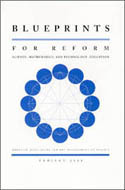New Momentum for Science Education Policy
Project 2061’s work to promote science literacy for all students has always recognized the critical role of local, state, and federal education policies in reform. In Blueprints for Reform (AAAS, 1998), Project 2061 identified policy as one of twelve areas central to standards-based reform and emphasized the need to engage stakeholders at all levels in the debate about improving science education.
With renewed attention on national science standards and science testing, Project 2061 has been participating in a number of policy-related efforts in which science educators are collaborating to explore such issues as connecting science education research to education policy, developing common core standards for science education, and preparing K-12 science teachers.
Below is a roundup of Project 2061’s recent and upcoming activities focused on science education policy:
Connecting Research to Policy and Practice
At the NARST Annual Conference in Philadelphia this March, Project 2061 Director Jo Ellen Roseman participated in a symposium on “Connecting Research to Policy and Practice.” Representatives from several NARST affiliates—AAAS, the Association for Science Teacher Education (ASTE), the European Science Education Research Association (ESERA), and the National Science Teachers Association (NSTA)—shared the current efforts of their organizations in the area of policy.
Panelists commented on important trends they see in teacher certification, curriculum, assessment, and standards, and suggested important areas of research that can impact policy. They also discussed how NARST members can engage with the affiliates and with the NARST organization in order to influence current and future policy decisions.
- View Roseman’s presentation on AAAS and Science Education Policy. [PDF, 223KB]
The Role of Public Policy in K-12 Science Education
Deputy Director George DeBoer led a session at the NARST Annual Conference related to a new volume he is editing on policy and K-12 science: The Role of Public Policy in K-12 Science Education, due to be published in late 2010 by Information Age Publishing. The session looked at the current interest in policy among science education researchers and policymakers, and proposed next steps. The other presenters, who are also authors for the new volume, were Dennis Cheek of the Ewing Marion Kauffman Foundation, Janice Earle of the National Science Foundation, Noah Feinstein from the University of Wisconsin, Sharon Lynch from the George Washington University, Jonathan Osborne from Stanford University, and Sarah Woodruff of Ohio’s Evaluation & Assessment Center for Mathematics and Science Education.
For DeBoer, the volume is a first step in thinking through what the field of policy research in science education might look like, a field in which the development and implementation of policy themselves are the objects of investigation.
- View DeBoer’s opening presentation on The Role of Public Policy in K-12 Science Education. [PDF, 35KB]
Conference on Science Education Policy
Hosted by the University of Delaware College of Education and Public Policy and sponsored by the National Science Foundation (NSF), an invitational conference on science education policy will be held this June at the Airlie Center in Virginia. George DeBoer will represent Project 2061 and has served on the conference’s advisory board.
According to organizer Nancy Brickhouse of the University of Delaware, the goal is to come up with a set of recommendations regarding the research that needs to be done to bridge the gulf between science education research and education policy. The conference will focus specifically on two policy issues that are central to current debates: the development of common core standards for science education and the preparation and professional development of science teachers.
Resources on Policy and K-12 Science Education
A resource already available for educators concerned with science curriculum and policy is Designing Coherent Science Education: Implications for Curriculum, Instruction, and Policy. Edited by Yael Kali, Marcia Linn, and Jo Ellen Roseman, this 2008 book synthesizes current research on the most promising methods and models for designing coherent science instruction. The book also offers policy recommendations to transform science courses so that they meet the needs of all students and attract more students to scientific careers. (Access a review of the book in this newsletter’s announcements.)
In addition to editing the policy volume from Information Age Publishing, DeBoer is contributing a chapter on the history of policies directed at equity in K-12 science education to a forthcoming NARST volume. As these and other resources at the intersection of science education policy with research and practice become available, Project 2061 Connections will report on them and provide access whenever possible so that you can apply them to your own work on behalf of science literacy.
# # #
For more information about Project 2061’s work in science education policy, please contact:
Director: Dr. Jo Ellen Roseman, (202) 326-6752
Deputy Director: Dr. George DeBoer, (202) 326-6624





